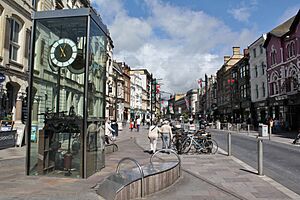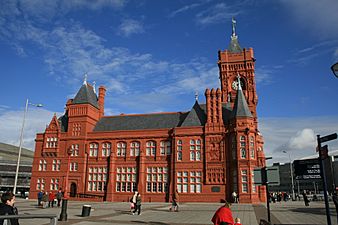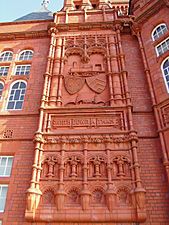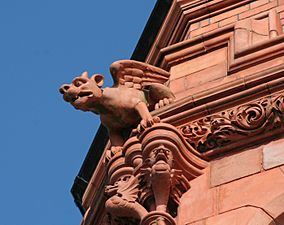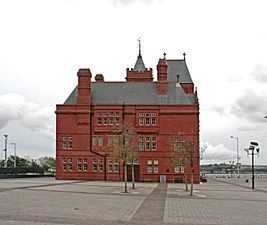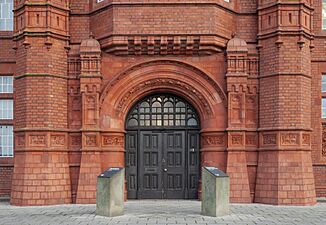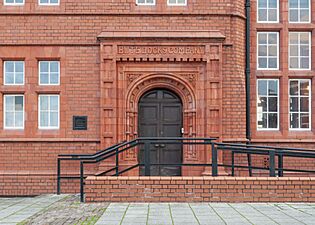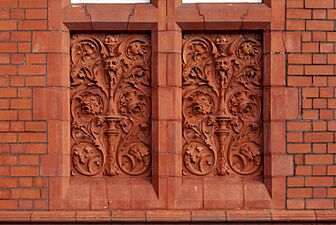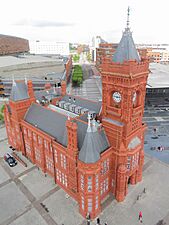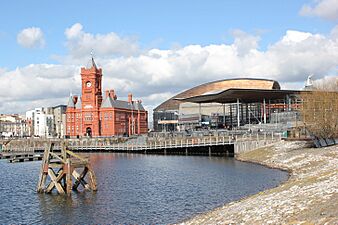Pierhead Building facts for kids
Quick facts for kids Pierhead Building |
|
|---|---|
|
Adeilad y Pierhead
|
|
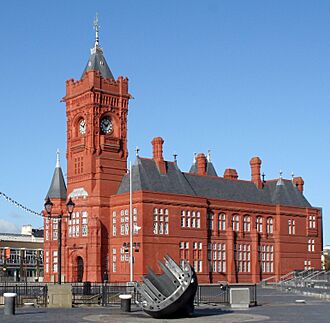 |
|
| General information | |
| Architectural style | French Gothic Renaissance |
| Location | Cardiff, Wales |
| Town or city | Cardiff |
| Country | Wales |
| Coordinates | 51°27′49″N 3°09′48″W / 51.463539°N 3.163389°W |
| Inaugurated | 1897 |
| Design and construction | |
| Architect | William Frame |
The Pierhead Building (which is called Welsh: Adeilad y Pierhead in Welsh) is a very important and beautiful building in Cardiff Bay, Wales. It was built in 1897. Its first job was to be the main office for a company called the Bute Dock Company.
Today, the Pierhead Building is part of the Senedd estate. The Senedd is the Welsh Parliament, also known as Welsh: Senedd Cymru. This area also includes the modern Senedd building and Tŷ Hywel. The big clock on the Pierhead Building is sometimes called the "Baby Big Ben" or the "Big Ben of Wales".
Contents
History of the Pierhead Building
How the Building Came to Be
The Pierhead Building was finished in 1897. It was designed by an English architect named William Frame. This new building was needed because the old headquarters of the Bute Dock Company had burned down in 1892. William Frame had learned a lot from his teacher, William Burges. They both worked on rebuilding famous places like Cardiff Castle and Castell Coch before Burges passed away in 1881.
The Bute Dock Company's Story
The Bute Dock Company was very important for shipping in Cardiff. In 1897, the company changed its name to the Cardiff Railway Company. You can see their special symbol, called a coat of arms, on the front of the building. It has their motto in Welsh: "Wrth ddŵr a thân". This means "by water and fire". This motto shows how steam power, made with water and fire, changed Wales.
After many years, in 1947, the building became the main office for the Port of Cardiff.
The Journey of the Pierhead Clock
The clock inside the Pierhead Building was made in 1897 by a company called William Potts & Sons. In 1973, the original clock parts were taken out and replaced with an electronic motor. The old parts were sold to a collector in America.
But the story didn't end there! In 2005, the old clock parts were brought back to Cardiff. Then, in 2011, they were fixed up by the Smith of Derby Group. Now, the old clock is part of a cool art display in Cardiff city centre. It was created by an artist named Marianne Forrest.
The Building's Amazing Look
What Makes the Pierhead Special
The Pierhead Building has a unique style that mixes French-Gothic and Renaissance designs. You can see many cool details on it. These include chimneys shaped like hexagons, fancy carved patterns called friezes, and even gargoyles! The clock tower is very decorative and stands out.
The outside of the building is covered in shiny glazed terracotta blocks. These blocks were made in the late 1800s by a company called J. C. Edwards & Co. They were located near Ruabon in Wrexham County Borough. This company was known for making some of the best terracotta in the world. All these special features, along with the building's important role in the growth of Cardiff's docks and industries, helped it become a Grade I listed building. This means it's a very important historical building that needs to be protected.
A Place for Visitors and Learning
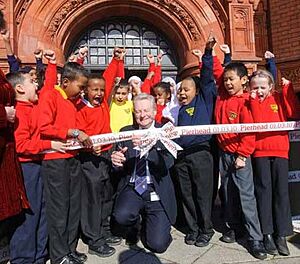
The Pierhead's New Purpose
In May 2010, the Pierhead Building opened its doors again. It became "The Assembly at the Pierhead". This was a special place for visitors and for learning about the National Assembly for Wales. It had exhibits that taught people about what the Assembly does.
Then, on March 1, 2010, the building opened again to everyone. Now, it's a museum and exhibition space about Welsh history. You can watch films and see displays that explore Wales's past. It also has spaces where people can talk about important topics and share their ideas about what happens in the nearby Senedd building.
Discovering Welsh History Inside
Inside the Pierhead Building, you can see some amazing historical items. One is the original binnacle from Robert Falcon Scott's ship, the Terra Nova. A binnacle is the stand that holds a ship's compass. You can also see a copy of the Pennal Letter. This letter was sent by Owain Glyndŵr, who was a Prince of Wales, to the King of France in 1406.
There's also a cool audio-visual display. It celebrates Welsh heroes who have made a big difference to Wales's culture and identity. These heroes include former prime minister David Lloyd George, fashion designer Laura Ashley, and the famous rugby player and broadcaster Ray Gravell.
Cardiff Bay's Journey Through Time
The films and exhibits also tell the story of Cardiff Bay. They show how it changed from the Neolithic era (a very long time ago) up to today. You'll learn how exporting iron ore and coal made Cardiff one of the busiest ports in the world. The arrival of railways in 1841 was a huge change. Goods could travel in an hour what used to take a month by canal!
The exhibits also explain how Cardiff Bay faced tough times. In the 1920s, people needed much less coal. Then, from the 1950s, big container ships started using other ports. This made Cardiff Bay go through a difficult period. But, by the end of the century, the area was rebuilt and became the lively place you see today.
Gallery
Views of the Pierhead Building
|
|---|
See also
 In Spanish: Pierhead Building para niños
In Spanish: Pierhead Building para niños
 | Valerie Thomas |
 | Frederick McKinley Jones |
 | George Edward Alcorn Jr. |
 | Thomas Mensah |


